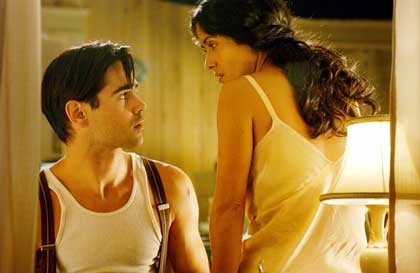Robert Towne returns to a fictional LA with Ask the Dust
“It gets you through and it pays bills,” writer-director Robert Towne concedes when pressed about how the guy who wrote Chinatown ended up penning Mission Impossible and its equally dreadful sequel. Towne has written two other films for Tom Cruise, Days of Thunder and The Firm, and considers the guy a close friend — which these days isn’t necessarily something to brag about. Nevertheless, Towne says too much has been made of Cruise’s couch-jumping incident. “People closest to him have often called him Laser Head. I’ve seen that enthusiasm in him before. It’s a little surprising and even intimidating, but he’s trying to breathe life into people, to get them to his energy level.”
| Colin Farrell, who stars as Arturo Bandini in Ask the Dust, was instrumental in bringing the Depression-era novel to the screen. Salma Hayek plays his love interest, Camilla Lopez. |
Speaking of energy levels, Towne’s is waning a bit judging by his languid drawl. It’s no wonder: The guy’s been writing films since the ’60s when he worked for Roger Corman. Maybe it’s finally taking its toll. His latest, also his fourth directorial effort (others include Tequila Sunrise and Without Limits), is the product of 35 years of hard work. Perhaps its release will warrant a breather for the aging filmmaker.
Ask the Dust, which stars Colin Farrell as author John Fante’s alter-ego Arturo Bandini and Salma Hayek as his Mexican lover, Camilla Lopez, fermented in Towne for more than three decades. “It started in 1970, when I was doing research for Chinatown,” he says. “I was looking for something that would capture what I saw to be the real day-to-day life in Los Angeles. Movies always had a heightened reality within Depression films.”
Fante’s novel, one of four he wrote about Bandini and his beloved Los Angeles, was largely forgotten by history until Charles Bukowski rediscovered the book on the shelves of the Los Angeles Public Library and forced his publisher, Black Sparrow Press, to republish the novel as preface to publishing his own work. Towne, however, had beaten him to the punch.
“I happened on this book quite by accident, and was just moved by it,” he says. “I had the same reaction to it, pretty much, that I had to The Catcher in the Rye.”
And so Towne did what any screenwriter would do when he discovers a book he absolutely has to adapt: He contacted the author. “I met with John, who was a curmudgeony little shit,” he laughs, later calling Fante “prickly and aggressive” and “surprisingly kind and sweet.” “He reacted by saying, ‘Who are you and why do you think you can judge my book?’”
Somehow Towne convinced Fante he was the man for the job, though, and a friendship was kindled that lasted until the author died in 1983. However, that didn’t mean anyone in Hollywood was willing to listen to Towne’s pitch for the project; a film about an Italian who dreams of marrying a beautiful blonde and a Mexican out to nab herself a WASPy last name didn’t scream moneymaker, one supposes.
“People considered it racist and a downer. No one saw it as the plea for tolerance that it was,” Towne says.
In the film, Bandini and Lopez collide in the context of a fictionalized Los Angeles that’s in the midst of a racial maelstrom; by 1930 one in six residents are Mexican, 200,000 out of a total population of 1.2 million. The American Dream is on the mind of every immigrant, which makes the romance between the two characters so volatile. The racism they both face has made them hate their own ethnicity and, consequently, each other.
For a time, Mel Brooks owned the rights to the book and wrote a script, but then, in some vague Hollywood fashion, he lost the rights, according to Towne. Actors came and went. Johnny Depp was interested at one point. An up-and-coming actress from Mexico named Salma Hayek read the script, too, but turned it down; having dealt with racism in the U.S. for much of her career, it didn’t seem like the right move for someone trying for crossover parts. Towne even brought his old buddy Cruise on board as a producer. In the end, though, it was a little-known Irish actor who showed up at Towne’s door and said, “You got a fucking beer?” who made it all happen. Farrell was meant to stay for half an hour to chat, but was there for 12. Towne swears all the cussing, boozing, and womanizing is just an attempt by Farrell to cover up the tenderness inside him. Whatever the case, Farrell loved the screenplay and stuck with it until his name was big enough to get it financed for a whopping $15 million.
And Hayek came around, too, after Warren Beatty, a friend of Towne’s, rang her. Years after she read the script the first time, she gave it another try. Her response, says Towne: “‘I wonder why I turned this down,’” •


